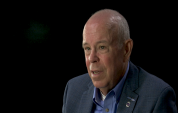6:56 | Lawson Magruder's father was a career Army officer who had his family with him at posts around the world. The younger Magruder's eyes were opened when they drove from Paris to Normandy and found the spot where his father was wounded in the battle. At a later post in the Philippines, he found inspiration at Corregidor.
Keywords : Lawson W. Magruder III Bryan TX University of Texas Austin TX Texas A&M D-Day Korean War Paris France Normandy Philippines Corregidor Bataan Death March

Family and faith helped LTG Lawson Magruder cope with the harder parts of a long career. That and a resilient state of mind. The new digital world may be making this kind of balance more difficult.
The timing didn't work out for Lawson Magruder to attend West Point, so he settled for his father's alma mater, the University of Texas at Austin. When the school recruited the elder Magruder to be Professor of Military Science, the entire ROTC got some seriously good instruction.
It was a tip that paid off. Learn from your platoon sergeant all you can. Lawson Magruder was a green lieutenant when his first platoon sergeant handed him a little green book.
Lawson Magruder was excited to be heading to Vietnam to an airborne unit, but he had a rude awakening when he was told he was going to the Americal Division. Well, he belonged to the Army and he went where they needed him. The young platoon leader had no more than a quick introduction to his men when he was off on his first air assault.
When the resupply convoy was scheduled at the firebase, the road had to be swept for mines and booby traps. LT Lawson Magruder sent a squad to protect the engineers who were performing the sweep. The men were then told by the convoy commander to ride the refuel truck back to the firebase. Lawson wished they had walked.
He was on the way to brigade headquarters. Lawson Magruder had been designated Lieutenant of the Week, something the brigade commander liked to do to give young officers a taste of high level operations. At the end of the day, he had a great surprise.
While he was beginning his shift as the night duty officer, Lawson Magruder would marvel at the wrecked helicopters brought back to base. The brigade had moved and tactics had not been adjusted for the fact that there were anti-aircraft batteries up near the DMZ. He relates the story of LT Dick Anshus and a downed pilot who were captured.
When Lawson Magruder returned from Vietnam, he took the lessons learned in that war and helped to shape the training programs of the new volunteer Army. He went to Fort Benning for the career course and that's when the dreaded Reduction in Force began to hit the officer corps.
Lawson Magruder tells the story of Nguyen Cong Luan, an ARVN officer he befriended at Fort Benning. He was here for training when it became apparent that South Vietnam would fall. He was offered asylum, but returned home to fight for his country and reunite with his family.
It's important to have a confidant or someone's ear to listen, even if it's just a journal. Lawson Magruder had his father, who had also been a career Army officer. This was important after a great loss in his platoon.
The army had to plan for operations that were short of total war, stability and security operations. Lawson Magruder worked with a team writing new light infantry doctrine, which was the type of force that would be tasked with these missions. Ironically, he was soon at the 10th Mountain Division, which was destined for Somalia.
The 10th Mountain Division deployed to Somalia, where LTG Lawson Magruder worked with his Marine counterpart to secure distribution of humanitarian aid and stop the fighting between rival factions. It was not yet the Information Age, so he and his staff would huddle around a lone satellite phone every evening.
There were two rival militia leaders in Somalia, both of whom had been in the Somali army. Both had also met with BG Lawson Magruder, who warned them to cease hostilities. They didn't listen.
Lawson Magruder, who commanded troops in the Somali deployment, was disturbed by what he discovered after the conflict was over. Partisan distrust following a change of administrations had sidelined the most experienced diplomat in the area. This contributed to an already bad situation.